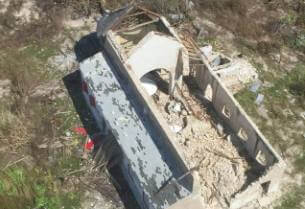The Venerable James Palacious, Archdeacon for Administration of the Diocese of the Bahamas and the Turks and Caicos Islands told the Alliance in a 21 October phone call that the hurricane had impacted up to 6,000 people on six islands, causing an estimated 60 million dollars in damage.
The Category 4 storm battered the central southern Bahamas with devastating winds and torrential rain in early October.
“We are used to hurricanes but this one is the worst one since [the 1928-9 hurricane season]. It was slow moving, came with little warning and hit areas where houses were not as well built,” he said. “The wind was ferocious.”
In some instances whole villages were wiped out. A number of diocesan buildings were damaged or destroyed, including the historic St David & St Augustine’s Church in Albert Town on Long Cay Island.
Archdeacon James said that in an initial response the Diocese had been partnering with Food for the Poor, an ecumenical relief organisation working in the Caribbean basin. The Alliance has learned that the Episcopal Diocese of Southeast Florida is channelling support through Food for the Poor, who with their expertise in the region were able to respond immediately and provide two 40-foot containers of supplies. These were distributed by the Diocese of the Bahamas and the Turks and Caicos Islands together with ecumenical partner the Bahamas Christian Council.
The affected islands are the least developed in the archipelago and the most difficult to access.
Archdeacon James said that on Long Island alone 95% of the fishing fleet was destroyed, which, in addition to the devastating loss of livelihood, prevented emergency support from reaching remote areas.
The storm had also damaged or wiped out roads, bridges and docks, making it difficult to get supplies where they were needed once they reached the islands, he added.
Trauma counselling
The Diocese has sent priests and counsellors to affected communities to give support in dealing with the psychological impact of the disaster. Many people were struggling with denial, anger or depression, Archdeacon James said, but the whole nation was becoming “experts in hurricane [recovery]”.
Clergy on the ground also are ensuring that emergency supplies are distributed fairly and that those who have disabilities or are otherwise particularly vulnerable are not overlooked.
Many people from the affected islands had come to live with relatives in Nassau, Archdeacon James reported, putting a strain on families’ resources. “People realise their interdependence but it is placing an additional burden on people on the other islands. Relatives are needing help to cope, too.”
Four Anglican schools on the northern islands of Grand Bahama and New Province made headlines as they opened their doors to displaced students from the southern islands until the hurricane-hit schools are operational again.
Preparing to rebuild
In the coming months the Diocese will focus on helping communities rebuild, Archdeacon James said. The Diocese is mobilising work teams, stocking materials and surveying areas.
Most homes were uninsured so people have lost everything through the storm. And they will need extra financial assistance to build new homes at a safer, higher altitude as climate change continues to leave its mark in rising sea levels, Archdeacon James commented.
“The weather is getting worse… In 50-75 years a percentage of the islands will be under water.”
This means that when storms like Hurricane Joaquin hit, there is increasing risk to long-term survival such as the contamination of wells with salt water, according to Clifton Dillon Nedd, Anglican Alliance Regional Facilitator for Caribbean.
“Damage to the infrastructure is repairable, but damage to things that sustain life, like water, is more serious,” he said.
Recovery will need also to address livelihood concerns following the destruction of crops, animals and boats and other materials. “For farmers, everything has gone, even the livestock,” Archdeacon James said.
Clifton Nedd also commented on the impact of changing weather systems: “This region is reeling from the effects of climate change: we are experiencing storms that behave in new ways. When a storm moves through quickly it can do significant damage only if it is fairly strong; however, when they move slowly, even very weak systems can wreak considerable havoc because of the increased opportunity to batter communities with wind, waves and rainfall.”
” If this emerging trend of slow moving systems becomes a permanent reality in the region it means that we now have to take added precautions against weaker systems which previously posed little to no threat. This has economic and social implications for our cash-strapped nations,” Clifton added.
The Diocese continues to fundraise for the response, which includes direct financial assistance to affected communities, and will be backed by funds from the Church in the Province of the West Indies. Episcopal Relief & Development and Us. (formerly USPG) have also pledged to support response activities through their disaster response and rapid response funding.
Archdeacon James asked for continued prayer and support.
Support the response locally in the Caribbean by contacting your local Anglican church or National Disaster office to make contributions. Support can be given internationally through donations to Anglican and Episcopal agencies including:
– Episcopal Relief & Development
Photo: After the hurricane: St David & St Augustine’s Anglican Church in Albert Town on Long Cay island. Credit: Katrina Vanderlip
Note: This story was updated on 11 November to include reference to the support of the Episcopal Diocese of Southeast Florida and the collaboration with the organisation Food for the Poor.

